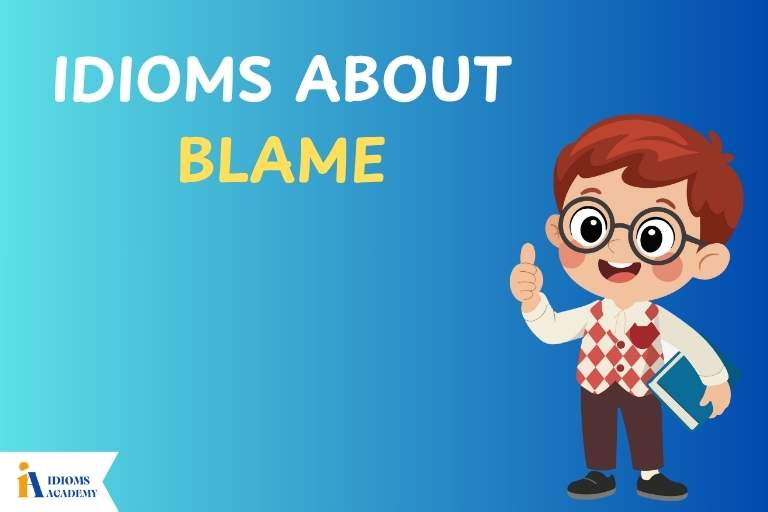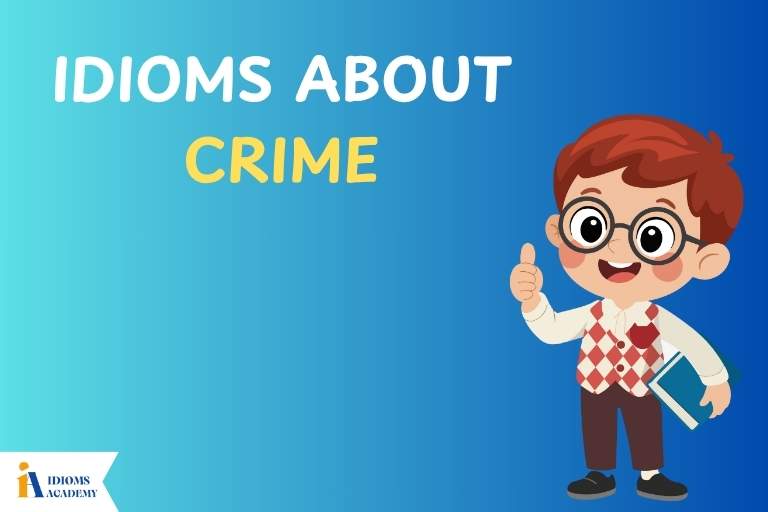Sometimes, things are so easy to see that we don’t need to explain them much. Imagine a friend hiding behind a tiny tree. You’d say, “That’s obvious!” In everyday life, people use fun and smart sayings, called idioms, to talk about things that are clear or easy to understand. These idioms make language more exciting and help us show ideas in a better way.
In this article, you’ll learn about idioms people use when something is very clear. These sayings are easy to remember and fun to use. They also help you speak and write in a more colorful way. Let’s look at some common idioms that describe things that are plain as day.
Idioms About Obvious
1. Plain as day
Meaning: Very clear or easy to see.
Example Sentence:
– It was plain as day that she was excited about the trip.
– The answer was plain as day on the board.
Other ways to say: Easy to see, clear
Fun Fact/Origin: Comes from the brightness of daylight, which makes things easy to notice.
Usage: Use this when something is very clear or hard to miss.
2. Like reading a book
Meaning: Easy to understand someone’s feelings or thoughts.
Example Sentence:
– I could tell he was upset, he’s like reading a book.
– Her smile was like reading a book—it showed everything.
Other ways to say: Easy to understand, see-through
Fun Fact/Origin: Books show stories openly, like people’s expressions sometimes do.
Usage: Used when someone’s feelings or actions are obvious.
3. The writing’s on the wall
Meaning: A clear sign something bad is going to happen.
Example Sentence:
– The store was always empty. The writing was on the wall.
– When the coach got quiet, the writing was on the wall.
Other ways to say: A clear warning, a sign
Fun Fact/Origin: From an old story in the Bible where a message appeared on a wall.
Usage: Used when something bad is clearly going to happen.
4. Clear as crystal
Meaning: Very easy to understand.
Example Sentence:
– The rules were clear as crystal.
– Her message was clear as crystal—no parties.
Other ways to say: Crystal clear, no confusion
Fun Fact/Origin: Crystal is see-through, which makes it a symbol of clarity.
Usage: Use when instructions or ideas are easy to follow.
5. Hit the nail on the head
Meaning: Say or do something exactly right.
Example Sentence:
– When she said we need more time, she hit the nail on the head.
– He hit the nail on the head with that answer.
Other ways to say: Got it right, exactly correct
Fun Fact/Origin: From hammering a nail—you need to hit it just right.
Usage: Used when someone’s guess or idea is exactly right.
6. An open book
Meaning: Easy to understand; not hiding anything.
Example Sentence:
– She’s an open book—she tells you everything.
– He’s like an open book when he’s nervous.
Other ways to say: Easy to read, honest
Fun Fact/Origin: Books are open and easy to read, like some people’s emotions.
Usage: Used to describe people who don’t hide their feelings.
7. No-brainer
Meaning: Something very easy to choose or do.
Example Sentence:
– Picking pizza was a no-brainer.
– It’s a no-brainer to wear a coat when it’s snowing.
Other ways to say: Obvious choice, simple decision
Fun Fact/Origin: Means you don’t even need to think hard.
Usage: Used when something is so simple, it’s almost silly to ask.
8. Obvious as the nose on your face
Meaning: Extremely easy to see or notice.
Example Sentence:
– His mistake was as obvious as the nose on his face.
– It was obvious she liked him—it was as plain as her nose.
Other ways to say: Totally clear, very easy to see
Fun Fact/Origin: Everyone can see a nose—it’s right there!
Usage: Used when something should be clear to everyone.
9. See right through (someone)
Meaning: Know what someone is really thinking or planning.
Example Sentence:
– I can see right through his excuse.
– She said she was fine, but I saw right through her.
Other ways to say: Understand the truth, not fooled
Fun Fact/Origin: Like glass—you can see what’s behind it.
Usage: Used when someone’s trying to hide something, but it’s clear.
10. A dead giveaway
Meaning: A sign that makes something completely obvious.
Example Sentence:
– His smile was a dead giveaway that he liked her.
– The crumbs were a dead giveaway—he ate the cookies.
Other ways to say: Clear clue, big hint
Fun Fact/Origin: “Dead” means certain, and a “giveaway” is a clear clue.
Usage: Used when something clearly reveals the truth.
11. Spot on
Meaning: Exactly correct.
Example Sentence:
– Your guess about the movie was spot on.
– She was spot on when she said it would rain.
Other ways to say: Exactly right, right on
Fun Fact/Origin: Comes from hitting a target perfectly.
Usage: Used to show someone got something exactly right.
12. A flashing sign
Meaning: Something that draws a lot of attention.
Example Sentence:
– His new shoes were like a flashing sign.
– Her laugh was like a flashing sign in the quiet room.
Other ways to say: Hard to miss, attention-grabbing
Fun Fact/Origin: Flashing signs get people to notice stores or ads.
Usage: Used when something really stands out.
13. Couldn’t be more clear
Meaning: Very easy to understand.
Example Sentence:
– Your directions couldn’t be more clear.
– Her message couldn’t be more clear—no phones in class.
Other ways to say: Super clear, simple
Fun Fact/Origin: This is just a strong way to say “clear.”
Usage: Used when there’s no confusion at all.
14. Like day and night
Meaning: Completely different or easy to tell apart.
Example Sentence:
– Their answers were like day and night.
– It’s like day and night between the old room and the new one.
Other ways to say: Total difference, clearly not the same
Fun Fact/Origin: Day and night are easy to tell apart.
Usage: Used when a difference is very clear.
15. Loud and clear
Meaning: Very easy to hear or understand.
Example Sentence:
– I heard you loud and clear.
– The teacher said it loud and clear—no homework today.
Other ways to say: Understood, no doubt
Fun Fact/Origin: From radio or walkie-talkie talk.
Usage: Used to confirm someone’s message was understood.
16. Jump off the page
Meaning: Very noticeable.
Example Sentence:
– Her colorful drawing jumped off the page.
– That spelling mistake just jumped off the page.
Other ways to say: Stands out, easy to see
Fun Fact/Origin: Used in writing or art when something is eye-catching.
Usage: Used when something is very easy to notice.
17. Blindingly obvious
Meaning: So clear it’s almost too easy to see.
Example Sentence:
– It was blindingly obvious he forgot his homework.
– Her feelings were blindingly obvious to everyone.
Other ways to say: Super clear, easy to notice
Fun Fact/Origin: “Blinding” means something so bright, it almost hurts the eyes.
Usage: Used when something is very, very clear.
18. Can’t miss it
Meaning: So easy to see that it’s impossible to ignore.
Example Sentence:
– The big red door? You can’t miss it.
– The balloon arch? You can’t miss it—it’s huge.
Other ways to say: Impossible to miss, right there
Fun Fact/Origin: People say this when giving directions or pointing out big signs.
Usage: Used to talk about something super easy to find or see.
19. Right under your nose
Meaning: Something obvious that was missed.
Example Sentence:
– The keys were right under your nose the whole time.
– The answer was right under my nose!
Other ways to say: In plain sight, easy to find
Fun Fact/Origin: The nose is close to the eyes—things “under it” are hard to miss.
Usage: Used when something is clearly there but gets overlooked.
20. Sticks out like a sore thumb
Meaning: Something or someone that is very easy to spot because it doesn’t fit.
Example Sentence:
– His bright shirt stuck out like a sore thumb.
– She stuck out like a sore thumb at the quiet meeting.
Other ways to say: Out of place, super noticeable
Fun Fact/Origin: A sore thumb looks red and swollen—easy to see.
Usage: Used when something doesn’t blend in at all.
21. Bright as a button
Meaning: Very alert or noticeable.
Example Sentence:
– That kid is bright as a button in class.
– Her new backpack is bright as a button.
Other ways to say: Easy to spot, sharp
Fun Fact/Origin: Buttons can be shiny and draw attention.
Usage: Used for people who stand out or for things that catch the eye.
22. The elephant in the room
Meaning: A big, obvious issue that no one wants to talk about.
Example Sentence:
– We didn’t talk about the broken window—the elephant in the room.
– The argument was the elephant in the room all day.
Other ways to say: Big issue, clear problem
Fun Fact/Origin: Comes from imagining a huge elephant that everyone pretends not to see.
Usage: Used when something big is being ignored.
23. Loud as a bell
Meaning: Very clear and easy to hear.
Example Sentence:
– His voice was loud as a bell in the hallway.
– Her “yes” was loud as a bell.
Other ways to say: Very clear, heard well
Fun Fact/Origin: Bells make sharp, clear sounds.
Usage: Used when something is said very clearly.
24. Show one’s hand
Meaning: To make something clear that was hidden before.
Example Sentence:
– He finally showed his hand and told the truth.
– She showed her hand when she picked the winning team early.
Other ways to say: Reveal, make clear
Fun Fact/Origin: Comes from card games where showing your cards gives away your plan.
Usage: Used when someone reveals their idea or secret.
25. It speaks for itself
Meaning: So clear that it doesn’t need an explanation.
Example Sentence:
– The trophy on the shelf speaks for itself.
– His test score speaks for itself—he studied hard.
Other ways to say: Obvious, self-explaining
Fun Fact/Origin: Comes from the idea that actions or results can tell a story without words.
Usage: Used when no extra words are needed to understand something.
Quiz: Idioms About Obvious
Instructions: Read each question and the answer choices carefully. Pick the letter that best matches the meaning of the phrase or expression.
Question Key
1. What does “plain as day” mean?
A) It’s hard to see.
B) It’s very easy to see or understand.
C) It’s something you only see at night.
2. If someone says “that was a no-brainer,” what do they mean?
A) It was a very hard choice.
B) They didn’t think about it.
C) It was an easy and obvious decision.
3. What does “an open book” mean when talking about a person?
A) They love to read.
B) They are hard to understand.
C) They show their feelings clearly.
4. What does it mean if something is “a dead giveaway”?
A) It’s hidden very well.
B) It clearly shows something.
C) It’s a prize you win.
5. When someone “hits the nail on the head,” what have they done?
A) They made a lucky guess.
B) They said something wrong.
C) They got it exactly right.
6. If a person says “you can’t miss it,” what do they mean?
A) It’s very hard to find.
B) You must stay home.
C) It’s super easy to notice.
7. What does “see right through someone” mean?
A) You understand what they are really thinking.
B) You use glasses.
C) You talk to them face to face.
8. What is meant by “the elephant in the room”?
A) A big pet that lives indoors.
B) A huge toy in your bedroom.
C) A big problem no one wants to talk about.
9. What does “stuck out like a sore thumb” mean?
A) It blended in perfectly.
B) It was easy to ignore.
C) It was very noticeable and didn’t fit in.
10. If something “speaks for itself,” what does that mean?
A) It needs someone to explain it.
B) It is confusing.
C) It is so clear, no words are needed.
Answer Key
- B) It’s very easy to see or understand
- C) It was an easy and obvious decision
- C) They show their feelings clearly
- B) It clearly shows something
- C) They got it exactly right
- C) It’s super easy to notice
- A) You understand what they are really thinking
- C) A big problem no one wants to talk about
- C) It was very noticeable and didn’t fit in
- C) It is so clear, no words are needed
Wrapping Up
Idioms about things being obvious help us speak more clearly and with fun. When something is easy to notice or understand, these sayings fit well. They help people know just what you mean without using too many words.
Next time something is clear, try one of these idioms. It’ll help you sound more natural and show your ideas better.




